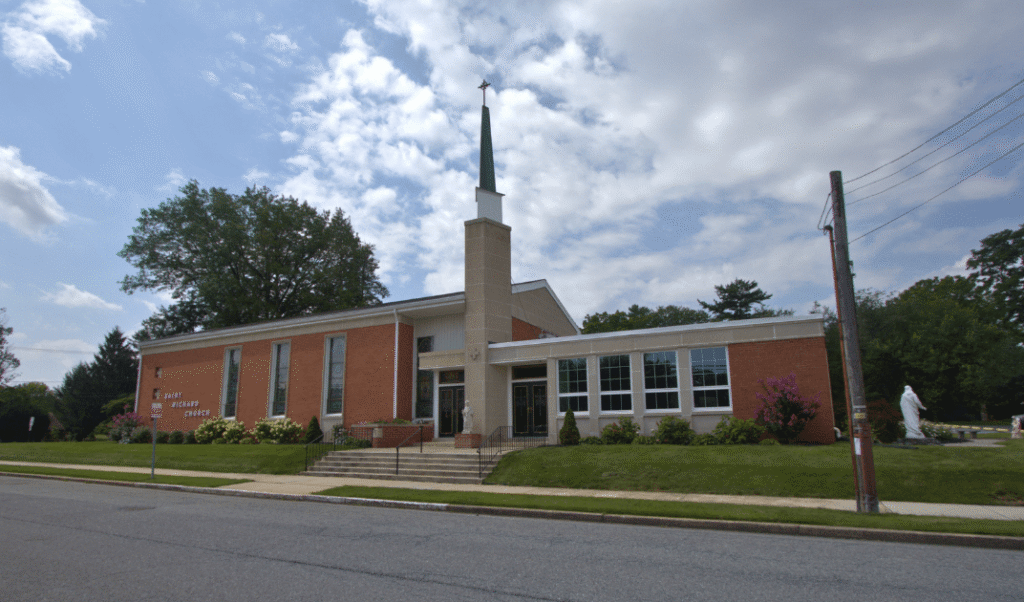
Faith Essentials
Core teachings every Catholic should know and cherish.
Catholic Mass Etiquette
Catholic Mass Etiquette
- Dress modestly and respectfully.
- Arrive to Mass on time.
- Make the Sign of the Cross with holy water when entering the church.
- Gentlemen should remove hats or caps.
- Genuflect facing the Blessed Sacrament in the tabernacle before entering the pew. If unable to genuflect, a bow is acceptable.
- Please silence cell phones prior to entering the church.
- Please be prayerfully silent. Refrain from unnecessary talking as it distracts others who are trying to pray and reflect.
- Fully and actively participate in Mass by singing hymns, reciting prayers, standing and kneeling with the rest of the congregation, and greeting others during the Sign of Peace.
- Listen to the readings as God speaks to you directly through His words.
- Fast one hour (this includes gum and mints) before receiving Holy Communion.
- Catholics receive Holy Communion with reverence. Please bow your head before receiving. You may receive the Holy Eucharist on the tongue or in your hand. Consume immediately.
- Please exit the church in silence after the recessional hymn, but only after the celebrant has completed the procession. Feel free to congregate in the Parish Hall.
- Please be sure to take all your belongings, leaving the pew and missal ready for the next Mass participant.
The Two Greatest Commandments
The Two Greatest Commandments
“You shall love the Lord, your God, with all your heart,
with all your soul, and with all your mind. This is the
greatest and the first commandment. The second is like it: You
shall love your neighbor as yourself. The whole law and the
prophets depend on these two commandments.”
Matthew 22:37-40
The Ten Commandments
The Ten Commandments
- I am the Lord your God: you shall not have strange gods before me.
- You shall not take the name of the Lord your God in vain.
- Remember to keep holy the Lord’s Day.
- Honor your father and your mother.
- You shall not kill.
- You shall not commit adultery.
- You shall not steal.
- You shall not bear false witness against your neighbor.
- You shall not covet your neighbor’s wife.
- You shall not covet your neighbor’s goods.
The Seven Corporal Works of Mercy
The Seven Corporal Works of Mercy
- Feed the hungry.
- Give drink to the thirsty.
- Shelter the homeless.
- Clothe the naked.
- Visit the sick.
- Visit the imprisoned.
- Bury the dead.
The Seven Spiritual Works of Mercy
The Seven Spiritual Works of Mercy
- Counsel the doubtful.
- Instruct the ignorant.
- Admonish the sinner.
- Comfort the afflicted.
- Forgive offenses.
- Bear wrongs patiently.
- Pray for the living and the dead.
The Seven Gifts of the Holy Spirit
The Seven Gifts of the Holy Spirit
- Wisdom is both the knowledge of and judgment about “divine things” and the ability to judge and direct human affairs according to divine truth.
- Understanding is penetrating insight into the very heart of things, especially those higher truths that are necessary for our eternal salvation—in effect, the ability to “see” God.
- Counsel allows a man to be directed by God in matters necessary for his salvation.
- Fortitude denotes a firmness of mind in doing good and in avoiding evil, particularly when it is difficult or dangerous to do so, and the confidence to overcome all obstacles, even deadly ones, by virtue of the assurance of everlasting life.
- Knowledge is the ability to judge correctly about matters of faith and right action, so as to never wander from the straight path of justice.
- Piety is, principally, revering God with filial affection, paying worship and duty to God, paying due duty to all men on account of their relationship to God, and honoring the saints and not contradicting Scripture. The Latin word pietas denotes the reverence that we give to our father and to our country; since God is the Father of all, the worship of God is also called piety.
- Fear of the Lord is, in this context, “filial” or chaste fear whereby we revere God and avoid separating ourselves from him—as opposed to “servile” fear, whereby we fear punishment.
The Four Cardinal Virtues
The Four Cardinal Virtues
- Prudence
- Justice
- Fortitude
- Temperance
The Three Theological Virtues
The Three Theological Virtues
- Faith
- Hope
- Charity (Love)
The Eight Beatitudes
The Eight Beatitudes
- Blessed are the poor in spirit, for theirs is the kingdom of heaven.
- Blessed are they who mourn, for they will be comforted.
- Blessed are the meek, for they will inherit the land.
- Blessed are they who hunger and thirst for righteousness, for they will be satisfied.
- Blessed are the merciful, for they will be shown mercy.
- Blessed are the clean of heart, for they will see God.
- Blessed are the peacemakers, for they will be called children of God.
- Blessed are they who are persecuted for the sake of righteousness, for theirs is the kingdom of heaven.
The Fourteen Stations Of The Cross
The Fourteen Stations of the Cross
- Jesus Is Condemned to Death. Pontius Pilate condemns Jesus to death.
- Jesus Takes Up His Cross. Jesus willingly accepts and patiently bears his cross.
- Jesus Falls the First Time. Weakened by torments and by loss of blood, Jesus falls beneath his cross.
- Jesus Meets His Sorrowful Mother. Jesus meets his mother, Mary, who is filled with grief.
- Simon of Cyrene Helps Jesus Carry the Cross. Soldiers force Simon of Cyrene to carry the cross.
- Veronica Wipes the Face of Jesus. Veronica steps through the crowd to wipe the face of Jesus.
- Jesus Falls a Second Time. Jesus falls beneath the weight of the cross a second time.
- Jesus Meets the Women of Jerusalem. Jesus tells the women to weep not for him but for themselves and for their children.
- Jesus Falls the Third Time. Weakened almost to the point of death, Jesus falls a third time.
- Jesus Is Stripped of His Garments. The soldiers strip Jesus of his garments, treating him as a common criminal.
- Jesus Is Nailed to the Cross. Jesus’ hands and feet are nailed to the cross.
- Jesus Dies on the Cross. After suffering greatly on the cross, Jesus bows his head and dies.
- Jesus Is Taken Down From the Cross. The lifeless body of Jesus is tenderly placed in the arms of Mary, his mother.
- Jesus Is Laid in the Tomb. Jesus’ disciples place his body in the tomb.
The Seven Last Words of Christ
The Seven Last Words of Christ
- “Father, forgive them, they do not know what they do.” (Luke 23:34): Spoken while being crucified, this is a prayer for his tormentors.
- “…today you will be with me in Paradise.” (Luke 23:43): A promise to a thief crucified alongside him.
- “Woman, behold your son. … Behold, your mother.” (John 19:26): A final instruction to his mother and the apostle John to care for each other.
- “My God, my God, why have you forsaken me?” (Matthew 27:46, Mark 15:34): A cry of anguish from the cross.
- “I thirst.” (John 19:28): A statement of his physical suffering.
- “It is finished.” (John 19:30): A declaration that his work is complete.
- “Father, into your hands I commend my spirit;” (Luke 23:46): His final words, a surrender to God.
Twelve Fruits of the Holy Spirit
Twelve Fruits of the Holy Spirit
- Charity
- Joy
- Peace
- Patience
- Kindness
- Goodness
- Generosity
- Gentleness
- Faithfulness
- Modesty
- Self-Control
- Chastity
The Four Marks of the Catholic Church
The Four Marks of the Catholic Church
- One (CCC 813-822): The Church is one because of her source (the Holy Trinity), her founder (Jesus Christ), and her “soul” (the Holy Spirit), who unites believers into one communion.
- Holy (CCC 823-829): The Church is made holy by Christ, who is
holy, and the Holy Spirit works within the Church to sanctify
her members. - Catholic (CCC 830-856): This means “universal.” The Church
is catholic because Christ is present in her, and she
possesses the fullness of the means of salvation. - Apostolic (CCC 857-865): The Church is apostolic because it
was founded on the apostles and has an unbroken line of
succession from them through the bishops, ensuring that the
original teachings are handed down faithfully.
The Five Precepts of the Church
The Five Precepts of the Church
- “You shall attend Mass on Sundays and on holy days of obligation and rest from servile labor.” (CCC 2042)
- “You shall confess your sins at least once a year.” (CCC 2042)
- “You shall receive the sacrament of the Eucharist at least
during the Easter season.” (CCC 2042) - “You shall observe the days of fasting and abstinence
established by the Church.” (CCC 2043) - “You shall help to provide for the needs of the Church.” (CCC 2043)

